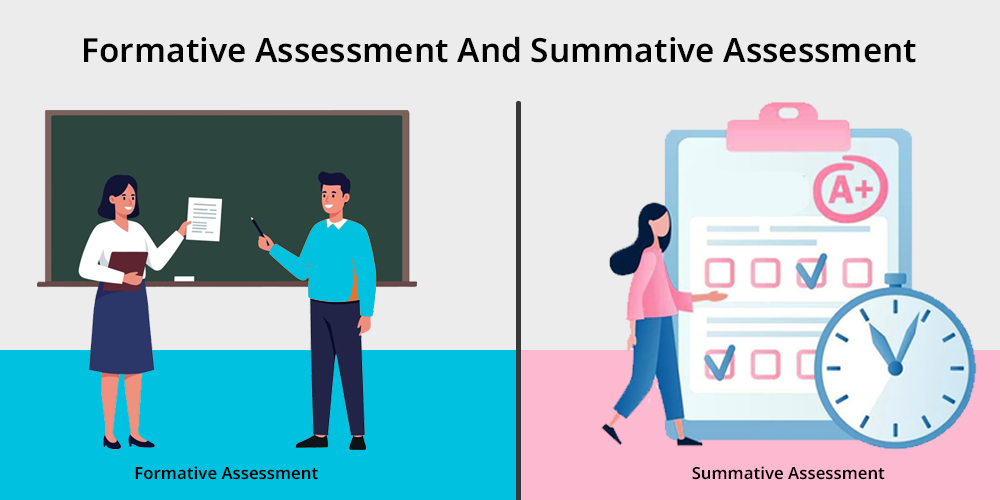
In today’s world, learning is not just about rote memorization or learning. It demands tests and assessments to figure out a student’s level and understanding of a particular concept or subjects. It is only meant for students but also for educators.
Assessment has been categorised into two parts: formative assessment and summative assessment. They both have different roles in learning, though they seem alike in themselves.
Know how to develop critical thinking skills in students
Contents
What is formative assessment?
Formative assessment is used to monitor the learning of students or provide them required feedback, immediately. It helps teachers or educators in assessing students about their tasks and performance.
They review students’ ongoing tasks before their evaluation and check on their improvements.
Formative assessment guides teachers and students about their tasks and learning with points to improve.
It provides instructions while working in order to improve and make growth before completion.
Examples of formative assessment, Asking questions and doubts in the classes, Reviews from teachers to improve learning, Peer group discussions and activities with peers to gauge oneself and improve.
Explore- online group projects helping students to engage in group discussions and activities with peers.
What is summative assessment?
Summative assessment evaluates students at the end of the learning sessions, on different parameters. These parameters could be based on learning’s after the completion of unit, semester or end of course term.
Summative assessment gauges you after the term ends and judges you in your learning and observation. This could in the form of marks grades and remarks as per their learnings and experiences.
It provides the summary of students’ performance and learning over the period of sessions or semester.
To get a better understanding of students’ education with development and involvement, go through real education with real time involvment.
Examples of summative assessment are, Final exams or end semester, End of unit test, Completion of assessment, Presentations or Final projects.
Difference between formative assessment vs summative assessment
Here are the following differences between formative assessment vs summative assessment.
| Basis of distinction | Formative assessment | Summative assessment |
| When | During learning period | After learning period |
| Requirements | Improvement | Evaluation and judgments |
| Grading | No grade | Gradements |
| Purpose | To monitor tasks and learning | To evaluate and judge based on their learning and observation |
| Use | Students learning and improvement | Final judgement or measuring achievements during the sessions or semester |
| Feedback | Immediate feedback given | General or evaluation after the end- term |
| Example | Quizz, Class discussions, Games and participation | Final exams, end term semester, tests, presentations or final projects |
Why does formative assessment vs summative assessment matter?
Assessments like formative assessment and summative assessment give a holistic approach to students’ learning.
These assessments contribute to the teacher- student learning process. Though they both serve different purposes, they both work best when used together.
They both together help in such parameters, provided with explanations. You can go through these parameters and know about their similarities in student evaluation.
1. Students learning
Formative assessment allows students to identify gaps and problems lacking in their learning. It helps students to stay on track and have consistent growth. It lets them take ownership of their learning and get feedback.
Know about cognitive development of children
On the other hand, summative assessment helps assess students on their learning gains. These assessments evaluate students on their learning and performance. Through these assessments, they can demonstrate mastery over their lack of learning.
They both create comprehensive learning experiences and deeper understanding. It helps in assessing students’ growth and improving as per their results.
2. Students support
Formative assessment supports students in their learning and growth. They provide immediate feedback to students, based on their assessment. It identifies and specifies the lack of learning.
Know about what is experiential learning and why is it important
Summative assessment judges students learning according to their performance. Teachers and educators evaluate students and mark them as per their learning and experience.
Evaluation processes are based on students’ learning outcomes. They can be such as, final exam, tests, end semester exams, presentations or final projects.
They both gauge students both on their learning and experiences. It provides support on their ongoing tasks and observations made through learning outcomes.
3. Evaluation
Formative assessment evaluates students’ learning process and makes improvements in teaching and learning process. This is in order to improve their ongoing learning and tasks.
Teachers or educated guides and give instructions as per their performance during the learning period.
Summative assessment evaluates and assesses learning outcomes and achievements. They track their academic progress and provide feedback in the form of final judgments.
Through this assessment, teachers and educators can know students’ learning performance and success.
Know about difference between assessment and evaluation
They both affect students’ learning since formative assessment improves their learning and summative assessment measures their outcomes. They together support learning by providing judgements as marks, grades and achievements.
Final thoughts
Assessments such as formative assessment and summative assessment are not rivals among themselves but partners. They promote students’ learning in students’ success and holistic approach of learning .
The use of formative assessment and summative assessment tally, as explained above . Educators can know and understand their use and use accordingly.
Such assessments help in improving educational support, outcomes and measure the learning of students.
Read more on- Skill-based education
However both the assessments serve different purposes but they both are important in the teaching and learning process. Both are equally necessary to gauge students’ performance. They determine their growth and success, which plays a crucial role altogether.
